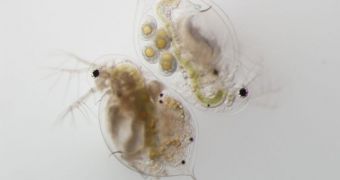A study conducted on the water flea species Daphnia dentifera revealed how the freshwater zooplankton lifeform behaves during periodic infections by an extremely virulent yeast parasite. The work showed that more resistance to the disease is not always a good thing.
When these periodic epidemics reoccur, as many as 60 percent of all Daphnia are infected. However, the team observed that the size of the infection, as well as the patterns in which the water fleas evolve, change based on several factors, such as predator presence and food availability.
A genetic analysis of the diminutive creatures reveals that they are able to evolve at an accelerated pace during epidemics, while at the same time taking great care to balance aspects of their lives such as reproduction and infection resistance.
Details of the new study appear in the March 30 issue of the top journal Science. Funds for the research came from the US National Science Foundation (NSF) and the James S. McDonnell Foundation.
“This study is a great example of why the most obvious response to disease, increased resistance, may not be the best solution. When populations are stressed by other factors such as food or predators, remaining susceptible to a disease is the best route to long-term success,” Saran Twombly explains.
The expert holds an appointment as a program director in the NSF Division of Environmental Biology.
In the Science paper, the team describes how the water fleas become more resistant to the parasite Metschnikowia bicuspidata, in waters where there are a lot of nutrients available, but few predators.
Conversely, in waters where only small amounts of resources are available, and where numerous predators exist, it is advantageous for these microscopic creatures to become more susceptible to the actions of the pathogen.
“It's counterintuitive to think that hosts would ever evolve greater susceptibility to virulent parasites during an epidemic, but we found that ecological factors determine whether it is better for them to evolve enhanced resistance or susceptibility to infection,” scientist Meghan Duffy says.
She holds an appointment as a biologist at the Georgia Institute of Technology, and was also the lead author of the new scientific paper.
“There is a trade-off between resistance and reproduction because any resources an animal devotes to defense are not available for reproduction. When ecological factors favor small epidemics, it is better for hosts to invest in reproduction rather than defense,” Duffy concludes.

 14 DAY TRIAL //
14 DAY TRIAL //